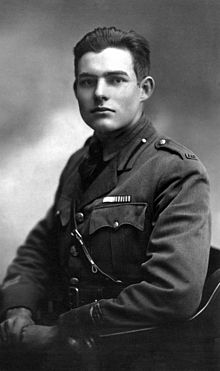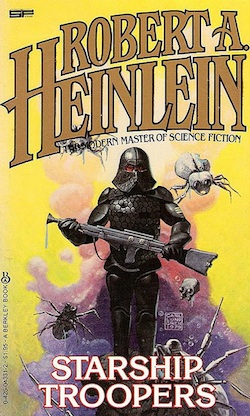When writing commentary, there are certain works of literature that require the writer to let the reader know of their inherent handicap. For example, I’ve wanted to write about the SF connections to Joyce’s Ulysses for years, but because there are heaps of Joyce scholars who know more than I do, the fear of an academic stoning prevents me from throwing my hat into that particular ring. Almost as dangerous, I am now talking about Robert Heinlein’s famous novel Starship Troopers. And this one has maybe more contradictory and contested analysis than any other SF novel of the 20th century. So how can I approach such a monstrous topic knowing that no matter what I think of this novel, many will disagree with me, and possibly vehemently?
This is how I’ll do it: I’ll pretend I’ve never read any analysis or criticism of Starship Troopers and just tell you what I think the book really is and why it works so well.
 The plot of Starship Troopers isn’t nearly as interesting as many of Heinlein’s other books. In fact, if one were to hand out his books in a writing class in which the goal was to teach usable structure, Starship Troopers would be on the list of things NOT to assign. Heinlein was of course capable of well-plotted books, like Tunnel in the Sky, but here we’re dealing with more voice-oriented stuff. In recently re-reading the novel, the voice I felt being evoked most strongly from the first sentences was not the internal character of Johnny Rico, nor of Heinlein himself. Instead, I experienced a direct channeling of Ernest Hemingway. Can I prove this? No, but I can make an argument. And when I’m done, I encourage any reader to try out the lens of “Hemingway Pastiche” while reading passages of Starship Troopers and not find similarities to For Whom the Bell Tolls or A Farwell to Arms. Even the first line, out of context, feels like a Hemingway thing. Check it out:
The plot of Starship Troopers isn’t nearly as interesting as many of Heinlein’s other books. In fact, if one were to hand out his books in a writing class in which the goal was to teach usable structure, Starship Troopers would be on the list of things NOT to assign. Heinlein was of course capable of well-plotted books, like Tunnel in the Sky, but here we’re dealing with more voice-oriented stuff. In recently re-reading the novel, the voice I felt being evoked most strongly from the first sentences was not the internal character of Johnny Rico, nor of Heinlein himself. Instead, I experienced a direct channeling of Ernest Hemingway. Can I prove this? No, but I can make an argument. And when I’m done, I encourage any reader to try out the lens of “Hemingway Pastiche” while reading passages of Starship Troopers and not find similarities to For Whom the Bell Tolls or A Farwell to Arms. Even the first line, out of context, feels like a Hemingway thing. Check it out:
I always get the shakes before a drop. I’ve had the injections, of course, and hypnotic preparation, and it stands to reason that I can’t really be afraid. The ship’s psychiatrist has checked my brain waves and asked me silly questions while I was asleep and he tells me that isn’t fear, it isn’t anything important-it’s just like the trembling of an eager racehorse in the starting gate.
Heinlein starts specific, puts you in Rico’s situation, then has the character make a disparaging remark about a “softer” character, and then ends the whole thing with an almost poetic metaphor about a trembling horse. The “writer” is Rico, who is not a totally realistic character insofar as most people in real life who are hardboiled and full of alpha-male testosterone, usually don’t sit down and compose beautiful sentences and come up with awesome and sentimental imagery. The actual author (Heinlein) is both paradoxically totally absent and inseperable from what’s going on. Here, I’ll reference a famous attack of this book’s validity: that it was simply a vehicle for Heinlein’s political views. Well, maybe it is. But if that’s true, he’s adopted a contradictory voice right from the first sentence. We know from this that Rico is not going to be a one-note character. By making Rico a reflective, Hemingway-esque narrator, the novel already tips its hat at the kind of writing it’s homaging.
Again, is this the only reading of this book? No. But it’s certainly what I felt upon this re-read. Any text about war will be accused of glorifying war to an extent. But when a novel like this goes so far to literally make every aspect about war, you have to wonder if you’re not meant to read between the lines. This isn’t an example of a a fully realized world. I know many point out that the specifics of the armor and drop ships have influenced everything from Aliens to Star Wars. But really, these are superficial side effects of what seems to be a much more disturbing and possibly satirical narrative tone.
Here’s another example of what I mean. Check out this passage from near the middle of the book when we’re right in the thick of a lot of the actual war stuff.
Six minutes! All hands, save yourselves, pick up your mates. Home on any beacon! Sauve-qui-”
I hurried.
His head came off as I tried to drag him out of his suit, so I dropped him and got out of there. On a later drop I would have had sense enough to salvage his ammo, but I was far too sluggy to think; I simply bounced away from there and tried to rendezvous with the strong point we had been heading for.
The deliberateness of the over-simplification of the language is conflated with eloquence in passages like this. Heinlein’s use of the word “simply” before the word “bounced” is helpful in making this SF world seem real, but it’s also just a good, whimsical set of words together which almost have no place in such a grim setting. The long-lens of someone who admits to having a future experience is also highly effective here, and rounds out the voice nicely of a character/writer who is highly introspective. Later on the same page, there’s this:
No matter, it was a beacon; I headed for it, using the last of my jump juice lavishly-got aboard just as they were about to button up and shortly thereafter was in the Voortrek, such a state of shock that I couldn’t remember my serial number.
I’ve heard it called a “strategic victory”- but I was there and I claim we took a terrible licking.
Never mind that what we’ve been told this book is about, the success of this novel is the atmosphere it creates though the power of a voice. The above passage proves this in several ways. First, a more efficient sentence would probably be “but I was there and we took a terrible licking.” Heinlein knows this, but he has Rico say “I claim we took a terrible licking” because the word choice gestures at the act of the solider trying to be a writer, perhaps the reverse of Heinlein; the soul of a writer who was once a solider. But the space being explored in Starship Troopers is all about how those two things overlap.
The chicken/egg scenario of which created the other isn’t clear. Would Rico have written down his experiences if he’d had a different life set within the same fictional universe? Unlikely. Would Heinlein have been the spectacular science fiction writer without his military service background? Equally unlikely. In this way, Hemingway and Heinlein are extremely similar. They’re not glorifying war by writing about it, nor are they writing outright satire of war. Instead, they’re just calling it like they see it. You’ve got to write what you know, and Heinlein knew the military. And because of his awesome imagination, he also knew science fiction.
For me, the author/character voice paradox is what makes Starship Troopers so compelling. Forget story, “character development” or how great the world is. From a sentence-to-sentence level, he keeps me going. Which is why Heinlein is among the greats, not just of SF, but of all literature.
Ryan Britt is the staff writer for Tor.com.










